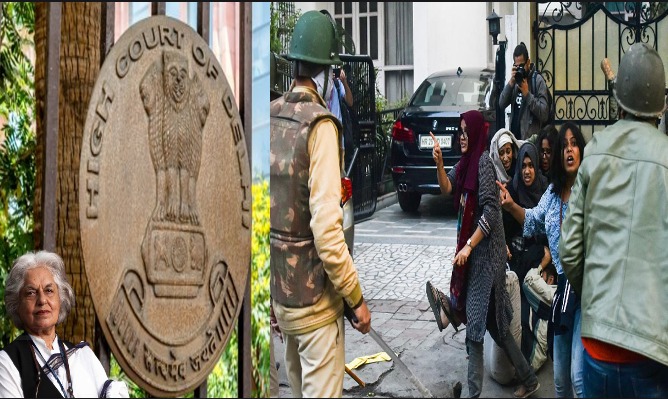
Senior Advocate Indira Jaising on Monday argued before the Delhi High Court that the Delhi Police did not have the authority to enter Jamia Millia Islamia in 2019 and that the use of force on students protesting against Citizenship Amendment Act (CAA) was wholly disproportionate to any public good.
The submission was made before a division bench of Justice Siddharth Mridul and Justice Talwant Singh, which was hearing a slew of petitions related to the varsity violence in December 2019.
Jaising was appearing in one of the petitions moved by JMI students seeking the formation of a fact-finding committee comprised of a retired Supreme Court or High Court judge to investigate the consequences and causes of the violence.
“The primary question I have is what legal authority did the police have to enter the campus? My contention is that they lacked legal authority to enter the campus. The question is whether the police are authorised to use force, and if so, to what end and with what proportionality?” Jaising stated.
Jaising submitted that the police entry into the university was “completely unauthorised” and “lacked legal backing.”
“The use of force inside and outside the premises was wholly disproportionate to any alleged public good. This type of force, which results in near fatal injuries, can only be justified in self-defense or in some jurisdiction,” she said.
Furthermore, Jaising argued that the Delhi police had “admitted” in its affidavit that they had stopped the protesting students from reaching the parliament somewhere near Mathura Road, after which the students began to return and enter the university grounds.
“There is an admission to that effect, that students retreated and, in that effort, they entered the university and the threat to the so-called law and order was diffused. The question is, if their goal was to stop students and they succeeded, what was the need to enter the university? What is the goal? The purpose could only be authorized by law, but there was none,” she explained.
According to Jaising, there is also an admission that the police did not seek permission from the University’s Vice Chancellor to enter the premises.
Submitting that it is now a case of trespass, Jaising stated that the then Vice Chancellor also made a statement that no permission was sought by the police or granted by JMI.
“The assumption then has to be that law and order were restored the moment the students retreated from Mathura Road and were on their way back to the university. The entire plan of demonstrating in parliament was successfully frustrated by the police, and their job was completed,” she said.
On the issue of excessive use of force by the police, Justice Mridul told Jaising, “The courts in India have generated enough jurisprudence on excessive use of force. We can assure you not only by the Supreme Court, but also by this and other courts.”
Justice Mridul added, “Excessive use of force cannot be justified at all. It cannot be. They (the Delhi Police) are responsible. As far as we know, the authorities are held accountable for the use of force. That is why you have come here, to request an investigation so that accountability can be established.”
In another related matter, Senior Advocate Salman Khurshid made submissions on the development of guidelines for the use of force by police in universities in order to regulate similar incidents.
Court’s attention was invited to several documents dealing with best global practises adopted by police to deal with peaceful protests in universities, as well as crowd control procedures standards issued by UNHRC and other bodies.
The court granted Khurshid time to file brief written submissions of no more than four pages.
The case will now be heard on May 8. The court has given advocate Rajat Nair, who represents the Delhi police, four weeks to file the NHRC report on the incidents in question.
In October of last year, the Supreme Court requested that “the High Court hear out the matter as soon as possible, given that these matters have been pending before the High Court for some time now.”




